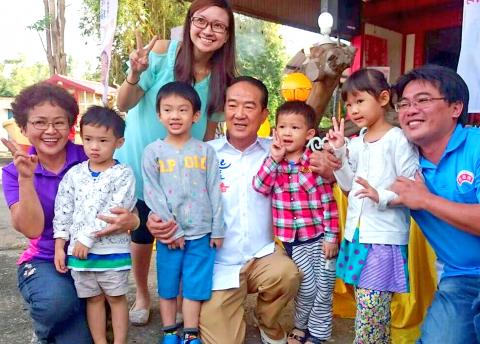Democratic Progressive Party (DPP) presidential candidate Tsai Ing-wen (蔡英文) has retained a more than 20-point lead over the presidential candidate fielded by the Chinese Nationalist Party (KMT), despite the party’s decision to replace Deputy Legislative Speaker Hung Hsiu-chu (洪秀柱) with KMT Chairman Eric Chu (朱立倫), a Cross-Strait Policy Association poll released yesterday indicated.
Tsai was supported by 45.2 percent of those polled, giving her a 23.3-point lead over Chu who garnered 21.9 percent, with 13.8 percent of respondents backing People First Party presidential candidate James Soong (宋楚瑜).
According to this and other association surveys, Tsai’s support is still about 40 percent, while Soong’s has dropped to a new low, giving the KMT’s presidential campaign a boost of 3.4 percentage points following its selection of Chu.

Photo: CNA
Among respondents who identify as pan-blue, 53.5 percent support Chu, showing a 7.8-percentage-point increase from an Oct. 7 poll conducted by the association.
Among pan-blue respondents, 23.6 percent said they would vote for Soong and 11.2 percent for Tsai, a 3-percentage-point and 1-percentage-point increase, respectively, from the previous survey.
In a head-to-head vote between Tsai and Chu, 54.4 percent of respondents said they would vote for Tsai while 27.2 percent for Chu.
Of those polled, 73.7 percent said Tsai had the best chance of becoming president. Only 8.7 percent thought Chu would win, while 2.1 percent said Soong would.
Regarding Chu’s decision to run for president even though he had promised to serve out his full term as New Taipei City mayor, 53.3 percent of respondents said they agreed he had betrayed his promise.
However, 41.1 percent said they agreed that Chu’s decision was made because he had no other choice in light of the party’s dismal election prospects.

Taiwanese can file complaints with the Tourism Administration to report travel agencies if their activities caused termination of a person’s citizenship, Mainland Affairs Council Minister Chiu Chui-cheng (邱垂正) said yesterday, after a podcaster highlighted a case in which a person’s citizenship was canceled for receiving a single-use Chinese passport to enter Russia. The council is aware of incidents in which people who signed up through Chinese travel agencies for tours of Russia were told they could obtain Russian visas and fast-track border clearance, Chiu told reporters on the sidelines of an event in Taipei. However, the travel agencies actually applied

New measures aimed at making Taiwan more attractive to foreign professionals came into effect this month, the National Development Council said yesterday. Among the changes, international students at Taiwanese universities would be able to work in Taiwan without a work permit in the two years after they graduate, explainer materials provided by the council said. In addition, foreign nationals who graduated from one of the world’s top 200 universities within the past five years can also apply for a two-year open work permit. Previously, those graduates would have needed to apply for a work permit using point-based criteria or have a Taiwanese company

The Shilin District Prosecutors’ Office yesterday indicted two Taiwanese and issued a wanted notice for Pete Liu (劉作虎), founder of Shenzhen-based smartphone manufacturer OnePlus Technology Co (萬普拉斯科技), for allegedly contravening the Act Governing Relations Between the People of the Taiwan Area and the Mainland Area (臺灣地區與大陸地區人民關係條例) by poaching 70 engineers in Taiwan. Liu allegedly traveled to Taiwan at the end of 2014 and met with a Taiwanese man surnamed Lin (林) to discuss establishing a mobile software research and development (R&D) team in Taiwan, prosecutors said. Without approval from the government, Lin, following Liu’s instructions, recruited more than 70 software

Taiwanese singer Jay Chou (周杰倫) plans to take to the courts of the Australian Open for the first time as a competitor in the high-stakes 1 Point Slam. The Australian Open yesterday afternoon announced the news on its official Instagram account, welcoming Chou — who celebrates his 47th birthday on Sunday — to the star-studded lineup of the tournament’s signature warm-up event. “From being the King of Mandarin Pop filling stadiums with his music to being Kato from The Green Hornet and now shifting focus to being a dedicated tennis player — welcome @jaychou to the 1 Point Slam and #AusOpen,” the